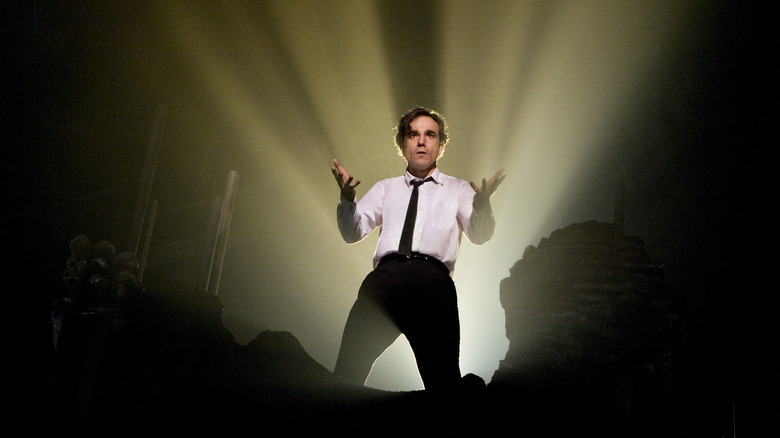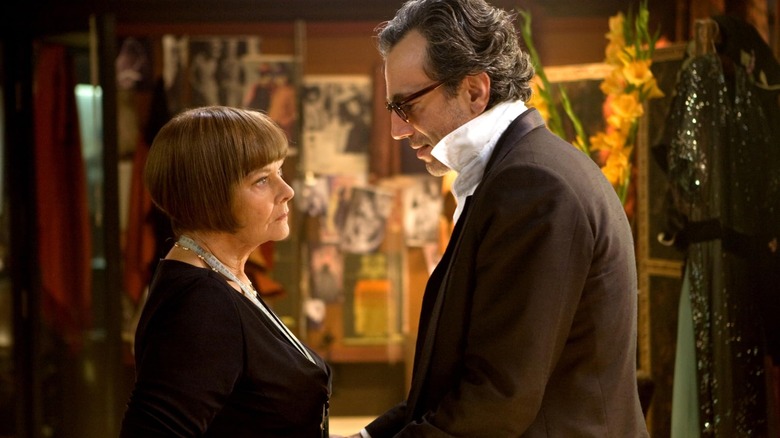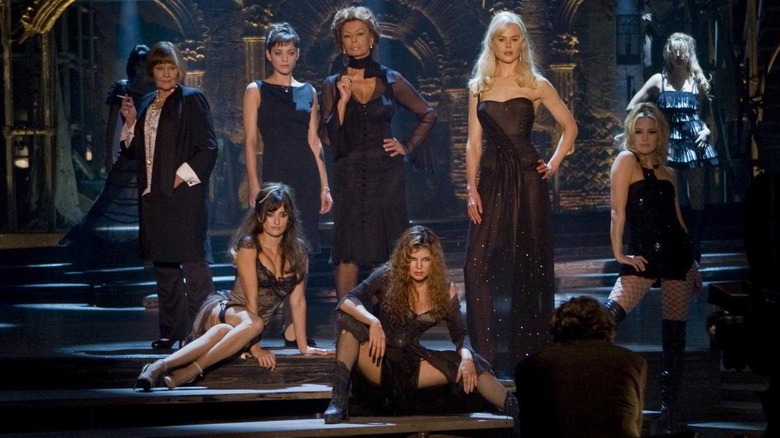The Worst Daniel Day-Lewis Movie According To Rotten Tomatoes
The 2009 film "Nine" — not to be confused with the 2009 film "9" — was an Oscar darling in the most frustrating possible way. It was nominated for four Oscars, including Best Supporting Actress (Penélope Cruz), Best Art Direction, Best Costumes, and Best Original Song. That was just enough nominations for mad Oscar completists to have to see "Nine," a movie that, many agreed, looked dull and baffling. The critics seemed to think so, anyway, as "Nine" only has a 39% approval rating on Rotten Tomatoes. It's the lowest approval rating of any film to star Daniel Day-Lewis.
"Nine" requires some explanation. Firstly, the film was based on a Broadway musical that debuted in 1982. The original production starred Raul Julia, playing a character that was very similar to, but legally distinct from, real-life Italian master Federico Fellini. The character, named Guido Contini, found both his marriage and his creative spirit flagging in the face of a midlife crisis. He was about to turn 40 (so old!), and he began to fear a dull future, absent of the nubile Italian women he spent his younger years romancing. Also, he has a mistress, which feels like a natural extension of a Fellini story. "Nine," as the title implies, was extrapolated from Fellini's semi-autobiographical 1963 cinematic freakout "8½," handily one of the most self-indulgent films ever made.
"Nine," then, was a 1980s Broadway show based on one of the most famous 1960s Italian movies of all time, and one might imagine there was a certain kind of arthouse-attending urbanite in the middle of the Broadway/Italian arthouse Venn diagram.
In 2009, however, when Rob Marshall adapted the musical to the big screen, many wondered who would want to see such a thing. Marshall previously had a big hit with his terrible version of "Chicago" in 2002, so it seemed logical — from a "we want to win awards" perspective — to give him another Broadway show to adapt. It seems, though, that lightning couldn't strike twice. The film bombed, critics hated it, and even Daniel Day-Lewis as Contini couldn't save it.
Say 'nein' to 'Nine'
The irony of Rob Marshall's film is that it won't be understood by people who are unfamiliar with Federico Fellini, and it won't be appreciated by those who are. Fellini, as mentioned, was already an intensely autobiographical filmmaker, and revealed his foibles, ego, and sexual proclivities in his own work on the regular. "8½" was his confession piece, a surreal dreamscape wherein he exposed himself to the world, using actor Marcello Mastroianni as his stand-in.
Putting that same process on stage without Fellini's involvement feels like adding a step to the process. Now, audiences have to dig through an extra level of meta-commentary to get to Fellini's confession. Then, to furthermore adapt the 1982 musical into another film, only muddies the waters into brackish opacity. The audience is now kept one additional step away from the source material and from Fellini's embarrassing emotional honesty. Fellini already had an avatar in the form of Mastroianni. What can be added by making a tertiary Fellini avatar played by Daniel Day-Lewis?
Additionally, in 2009 — and produced by Harvey Weinstein, recall — the central drama of "Nine" no longer felt fresh or desired. There is a certain tiresome narrative that one might have encountered wherein an aging male artist spends the length of a movie/novel/play lamenting the waning of his once-powerful libido. Anything from "Death in Venice" to "The Other Side of the Wind" sees a middle-aged man wallowing in self-pity, whining that he doesn't get to bang as many 20-year-olds as he once did. It seems that many audiences weren't interested in "Nine" because they didn't want to see Day-Lewis sing about how he's slightly less horny.
The Rob Marshall factor
It didn't help that "Nine" had the same indistinct, shadowy aesthetic of "Chicago." Someone needs to tell Rob Marshall that musicals can be well-lit and well-edited. Although a mere 118 minutes, "Nine" was a prolonged slog. Even guest appearances from Kate Hudson, Nicole Kidman, Judi Dench, Sofia Loren, and Fergie couldn't spice up the flick. Marion Cotillard played Mrs. Contini (based on Fellini's real-life wife, actress Giulietta Masina), and she does what she can with the material, but none of these actresses are given a feast. Indeed, they all play second-fiddle to the whiny, insecure man in the middle. Day-Lewis can ordinarily pull pathos and personality out of even the slightest roles, but here, he seems unable to find anything.
Critics were not kind to "Nine." Alissa Wilkinson, writing for Paste, found the film to be tiring, episodic, and uninspired. Roger Ebert said that it was an unnecessary film, given that "8½" already exists. Dave Kehr, writing for Film Comment, noted that the musical numbers were too divorced from the central action to contribute to the film. He even noted that Day-Lewis was miscast, writing "'Nine' was probably doomed from the moment Day-Lewis ... was cast in a role for which he has no visible affinity, apart from the two Oscars he brings to the table."
And that comment gets to the heart of "Nine" and the cynicism that inspired it. This film wasn't made because the filmmakers loved Fellini or even the original Broadway musical. This film was put into production because the makers wanted more Academy Awards. Clearly, the producers felt that if they found the right material, hired a known director, and rammed a bunch of big movie stars into their movie, then Oscar voters would take the bait, even if the film sucked.
The sad part is it worked. "Nine" didn't win any Oscars, but it was nominated. In a just world, the film would have been rightly ignored.


